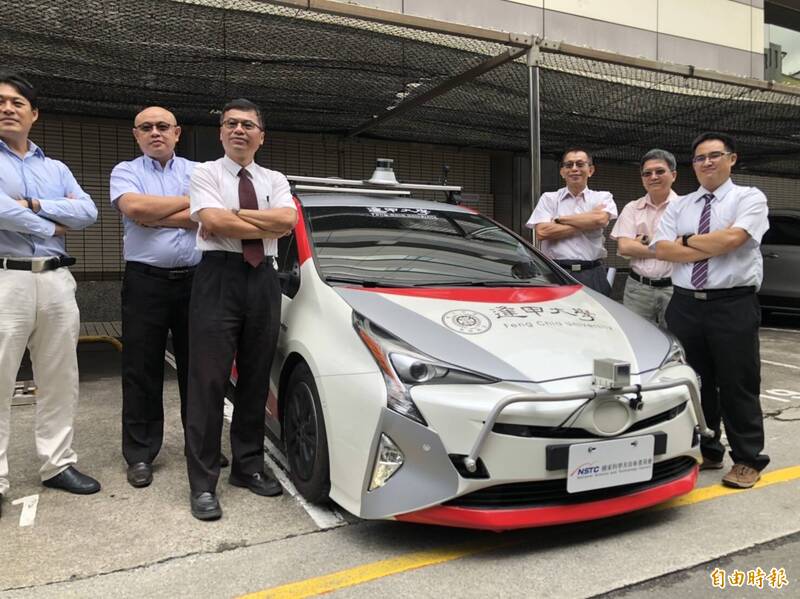Lin Yucheng's (first from right) team successfully developed the first domestically produced smart electronic vehicle shock absorber system.
(Photo by reporter Yang Yuanting)
[Reporter Yang Yuanting/Taipei Report] The comfort of riding a vehicle, transporting precision instruments or fragile items, is testing the shock-proof system of the vehicle. With the support of the National Science Council, the team of Associate Professor Lin Yucheng of Feng Chia University combined with the AI system. From a distance, we can instantly identify the common pavement defects such as potholes, water hole covers, and standing water on Taiwan's roads, and combine the team to develop and use a shock absorber system with domestically produced parts. 1/3, the system can also be used for all types of cars, motorcycles and so on.
Lin Yucheng, Professor Chen Wenhui of the Institute of Automation of Beijing University of Science and Technology, and Associate Professor You Zhengji of the Department of Vehicles, as well as Distinguished Professor Chen Shilun of the Department of Electronics of Zhongyuan University, Hong Sanshan, Professor of the Department of Automation of Feng Chia University, and Associate Professor Lin Weilun of the Department of Communication, formed a cross-disciplinary research team, and cooperated with the domestic manufacturer Chi Mei Automobile. Electricity and other cooperation, developed "national production of intelligent electronic shock absorber system".
Please read on...
Lin Yucheng said that the system uses AI image recognition technology to instantly identify a total of 6 common pavement defects on Taiwan's roads, such as potholes, speed bumps, manhole covers, expansion joints, puddles, stagnant water, etc., and can identify the effective distance of 20 kilometers. It is suitable for the vehicle speed below 100 km/hr, and is implemented in the embedded system of the vehicle specification. The computing speed is > 20FPS (single core), which has the application value of the automotive electronics industry, and the system has passed the international standard ISO-2631-1 for ride comfort. It is also the first domestically-made system that has obtained this certification. This system can also improve steering sensitivity, and because of the combination of the perception system, the shock absorber system can be adjusted in advance to increase vehicle handling and stability. Vehicles equipped with this system, even common domestic vehicles, are more stable than imported luxury vehicles.
Lin Yucheng said that if you want to increase the speed of the vehicle, achieve the same shock absorption sensing, and detect whether there are potholes 20 meters in advance, there is no problem, as long as the sensitivity of the sensing lens can be adjusted. As an option for all cars and rolling stock, it can also be tailored to your needs.
The shock absorber system has also created the world's first road defect sample database. Lin Yucheng said that the database has collected 89,723 sample data at present, which is different from the previous database of only potholes and cracks. Extensive collection of 6 types of road defects common in Taiwan. In the future, the computing method of this database can be extended to Southeast Asia where road conditions are more complex and changeable.
Lin Yucheng also compares the system developed by the team with the shock absorber systems of the car brands on the market. At present, similar shock absorber systems are usually used in luxury cars with a top gauge and a market price of about 5 million. The system developed by Lin Yucheng's team can sense the road surface. In addition to more defects, it can be widely used in all models, and the optional price is only 1/3 of the luxury car.
Lin Yucheng said that at present, large bus manufacturers and auto manufacturers targeting the Southeast Asian market have come to negotiate. He expects that after the popularization of the system in the future, it can reduce the damage caused by vehicles hitting potholes, and also reduce the damage caused by motorcycles. The hole led to regrets such as the death and injury of the knight himself.
Lin Yucheng's team successfully developed the first domestically produced smart electronic vehicle shock absorber system.
(Photo by reporter Yang Yuanting)
